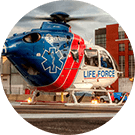Heart attacks, strokes, neurological injuries or any life- or limb-threatening emergency have one thing in common: time is critical. Depending on where those accidents or illnesses occur, air ambulances are often called to treat patients and transport them quickly to the most appropriate medical care for their condition. No one gets insurance pre-approvals for this type of emergent medical care because there simply isn’t time to spare.
A recent investigative report on NBC News *highlighted this pervasive problem faced by patients dealing with unplanned medical emergencies. According to the report, “1 in 10 medical claims are denied by insurers…. usually for higher cost services.” ** Many of the reasons for denials, especially of air ambulance transport, are that the service requires pre-approval. Air ambulance care serves to solve two important issues in medical emergencies: time and distance from the scene of an accident or illness.
Medical Helicopter Costs
When the emergency is over, families are often left to deal with another crisis: the cost of care. In the United States, most people prepare for medical bills by purchasing insurance privately or through a group plan. Unfortunately, instead of getting a manageable bill for copays or coinsurance, thousands of Americans are left to pay the full cost of air ambulance or other necessary medical treatment when claims are denied by insurance providers.
Given the high costs of air ambulance care, patients should consider financial preparation before an emergency arises. Insurance may not cover the costs of medical helicopters, and even when some of those charges are covered, outstanding copays and coinsurance may still be a financial burden. Fortunately, many air ambulance providers recognize that patients need better financial security and peace of mind. For this reason, air ambulance memberships can ensure air ambulance costs, even with insurance denials, can be planned for in advance.
AirMedCare Network (AMCN) is the country’s largest air ambulance membership organization. Members who are transported by their providers in 38 states from over 320 bases face no out-of-pocket costs related to their air ambulance care. This financial peace of mind can offset the worry about insurance coverage denials after the transport is completed. AMCN has patient care advocates on staff to help navigate working with a patient’s insurance company so families can focus on what’s most important – recovery.
Frequently Asked Questions:
If an AirMedCare Network Provider does not transport you, you will be responsible for payment. Our membership program only covers transports provided by our affiliates.
There is no limit to the number of transports a member may take in a year. Each transport is handled the same way and must be an emergent or time-sensitive transport as determined by a physician (or other appropriate provider) or first responder unaffiliated with AMCN.
With an AirMedCare Network membership, any person or persons who reside under one (residential) roof are covered. In the event we have a member who lives in a duplex or apartment complex, we designate the primary member’s residence/address— that is considered the “one roof”. Undergraduate college students can be covered under their parent’s membership as well as anyone previously residing in the household who is then moved to a permanent care facility.

How Air Ambulances Can Help Reduce Emergency Room Wait Times
Patient experience in healthcare has been a hot topic for the past 20 years. Studies show that when patients are happier with their care, they

Holiday Gifting for the Family That Has Everything: Unique Gifts They’ll Truly Appreciate
Finding the perfect gift for a family that seems to have it all can feel nearly impossible. They already own the latest gadgets, their home

A flight nurse’s courage: How one hero stepped up when it mattered most
Across the country, emergency medical professionals are trained to respond at a moment’s notice®. But sometimes circumstances make a difficult situation even more challenging —




